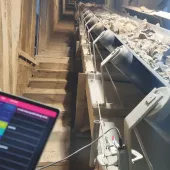Embracing the collaboration potential within MRO
Aggregates industry could be missing a trick in not maximizing biggest opportunity area for efficiency gains, say RS
RS, high-service global product and service solutions providers for industrial customers, are urging aggregates industry operators to embrace the collaboration potential within maintenance, repair and operations (MRO), as the sector faces more challenges than ever.
Ageing assets, health and safety, and recruitment and retention are ongoing challenges for the industry. But with rising energy costs and net-zero targets adding to the burden, operators must identify and leverage all strategies available to them.
Richard Graham, RS’s industry sector manager for heavy manufacturing, said: ‘Aggregates play a crucial role in the fabric of modern life: the minerals sector is a major contributor to the national economy, with a gross value of £8 billion in 2021. It employs 80,000 people directly and supports a further 3.2 million jobs in the supply chain.
‘It is facing an unprecedented level of challenges, so developing solutions to them is key. MRO represents a relatively small part of the budget, but it’s one of the biggest areas of largely untapped opportunity in terms of efficiencies and cost reduction. Much of this potential value depends on a shift away from transactional relationships between aggregate organisations and their suppliers, towards more strategic partnerships.’
RS have launched an e-book, The Aggregates Industry: Material Challenges, covering the key challenges in more detail. It also contains information on solutions and examples of innovation and collaboration in the sector.
Illustrating the positive effects of collaboration, RS helped one of the UK’s leading providers of construction materials achieve efficiencies and free-up skilled operators to focus on core tasks. The RS team worked with this customer’s central procurement, maintenance, and engineering functions to understand the existing procure-to-pay process and identify major pain points.
With a spend of around £40,000 per annum on consumables in this area, this part of operations was essential to 24/7 running of the plant. The knock-on effect of parts not being available was significant, with just a reduction of speed of the kiln costing £14,000 per hour. The firm was suffering due to poor inventory visibility, leading to unnecessary purchases and downtime.
The RS team proposed the introduction of their managed inventory service RS ScanStock for the replenishment of fast-moving critical items. RS put boots on the ground on a weekly basis, replenishing 422 lines of products every month. The introduction of RS ScanStock has eliminated 260 orders per annum, and £20,720 in costs associated with raising purchase orders every year.
Additionally, an estimated £2,600 in costs will be avoided by streamlining the processes around goods received, counting, and putting stock away. More than 15 days per year have been clawed back for the engineer who had been conducting a weekly stocktake. The total estimated annualized efficiencies amount to £118,437.
RS’s Indirect Procurement Report 2025 highlighted day-to-day MRO procurement challenges, with 40% of survey respondents citing a need to deliver annualized cost savings. Sixty-nine percent of those surveyed that use managed inventory services do so for better visibility of stock and spend, and 67% to reduce the time spent on raising individual orders.
Richard Graham concluded: ‘By embracing value-added services and solutions that suppliers can offer, aggregate producers and manufacturers can face the difficulties that lie ahead and build a rock-solid future.’
The Aggregates Industry: Material Challenges, can be downloaded here.










